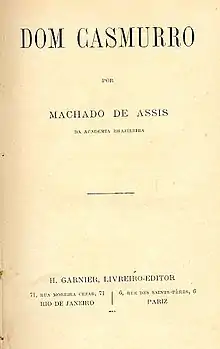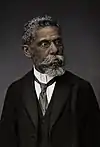Dom Casmurro
Dom Casmurro is an 1899 novel written by Brazilian author Joaquim Maria Machado de Assis. Like The Posthumous Memoirs of Bras Cubas and Quincas Borba, both by Machado de Assis, it is widely regarded as a masterpiece of realist literature. It is written as a fictional memoir by a distrusting, jealous husband. The narrator, however, is not a reliable conveyor of the story as it is a dark comedy. Dom Casmurro is considered by critic Afranio Coutinho "a true Brazilian masterpiece, and maybe Brazil's greatest representative piece of writing" and "one of the best books ever written in the Portuguese language, if not the best one to date." The author is considered a master of Brazilian literature with a unique style of realism.[1]
 | |
| Author | Machado de Assis |
|---|---|
| Country | Brazil |
| Language | Portuguese |
| Genre | realism |
| Published | 1899 (1st Brazilian edition), Livraria Garnier, Rio de Janeiro |
Major themes
Machado de Assis was fascinated with the theme of jealousy, and many of his novels are built on this intrigue. One of his most popular ones, Dom Casmurro, is still widely read in Brazilian schools. The volume reflects Machado de Assis' life as a translator of Shakespeare, and also his influence from French realism, especially Honoré de Balzac, Gustave Flaubert and Émile Zola. In the novel, he also refers to Much Ado About Nothing, The Merry Wives of Windsor, Hamlet, Romeo and Juliet and, most importantly, Othello.
Here, Machado de Assis shows a different version of the classical adultery: the story is told through the eyes of Bento Santiago (Bentinho), the betrayed husband. Throughout the story, the character narrates the supposed betrayal of his beloved Capitu (Capitolina, in allusion to the Roman Capitolinus), a version of Desdemona, who, according to him, cheated on him with his best friend, giving birth to a son that only later he "found out" to be not his. However, the facts that he shows as proof are very flimsy, and could easily be interpreted as paranoia. It could be all in his imagination, though the narrator hardly considers this an option. It is a tale with an unreliable narrator, so the reader never has a direct answer to whether Capitu cheated on him, and the outcome is still one of the most discussed among Brazilian literature fans and critics. The Brazilian writer Dalton Trevisan once noted that Dom Casmurro is not to be read as the story of Capitu betraying Bentinho, but as a story of jealousy itself.
Another measure of the writer's literary achievement is given by the more profane conclusion that, were Capitu and Bento to go to court, neither would be able to win solely on the basis of details comprised in the novel.
Bento Santiago
Bento Santiago is the protagonist of the book Dom Casmurro of Machado de Assis. Occupying the position of anti-hero his profile can be followed in three distinct phases: Bento, Doctor Bento Santiago and Dom Casmurro. In old age, moment of narration was reclusive and sad man that earned him the nickname of Dom Casmurro. The memories of a sad and painful past made him a person of few friends. With the desire to tie his adolescence to old age decides to reproduce house where he lived in his youth, but that is not enough. He then decides to write an autobiographical book as narrated his memories trying to relive the past.
On one occasion in November 1857 received the complaint that was passionate about Capitu by the aggregate of his family José Dias that in a conversation with his mother advised him to put it quickly in the seminar in order to fulfill an ancient promise, because already suspected that Bento would be in love with Capitu. Those words evoke feelings of Bento and he begins to realize that he actually likes her and that is reciprocated.
So both begin making plans to free Bento from the seminar, and Capitu gives the idea of talking to Jose Dias. Thus, moved by his own interests, decides to help them. All in all, he ends up becoming seminarian. There he meets Escobar, who becomes his best friend. After a while in the seminar he convinces his mother to let him out of there due to a plan of Escobar. The idea was his mother defraying the cleric formation of an orphan boy in his place.
Having escaped the promise to his mother, he graduated in law and married Capitu. Escobar, who had also left the seminar married Sancha, the best friend of Capitu. Furthermore, the two couples became close friends. After a while Ezequiel was born, the son of Bento and Capitu. The name chosen was in honor of his friend whose first name was this. All went well until one day a tragedy occurs in that Escobar drowns. Bento noticed a great sadness in Capitu. A day after his friend's death he notices a striking resemblance between her son and Escobar from there starts to get increasingly certain that he had been betrayed by his wife.
At one point, he contemplates suicide and even murdering Ezequiel, but immediately repents. He then decides to divorce Capitu. She goes to Europe with his son. Over time his uncle, his mother and José Dias die. And one day Ezequiel returns from Europe with news of the death of Capitu. Bento thought him very similar to Escobar. Shortly time after this, his son dies in a trip to the Middle East. So he becomes an increasingly lonely and embittered person, unable to trust anyone, with the certainty that his wife committed adultery.
Bento proves to be an adolescent marked by shyness, without much initiative and very dependent. From childhood, has always been very spoiled by his family. This overprotection made him an insecure and dependent individual, unable to make decisions on his own and solve his own problems. At various times he reveals an extremely jealous person. This insecurity was undoubtedly the triggering event of suspicion of adultery that marred his life.
Adaptations
A re-imagined Dom Casmurro was written by Lygia Fagundes Telles and her husband, Paulo Emílio Salles Gomes, in 1969. It is called Capitu (after the novel's female character), and is in film script format.
In 1998, Fernando Sabino published the novel Amor de Capitu. In this version, the narrative was rewritten in third person. [2]
A television miniseries titled Capitu was released in 2008.
A comic book adaptation was made in 2012 by Mario Cau and Felipe Greco. This comic won the 2013 Prêmio Jabuti (the most traditional Brazilian literary award) in "best illustration" and "best school related book" categories[3]
References
- Jackson, K. David (February 22, 1998). "Madness in a Tropical Manner". The New York Times. Retrieved January 5, 2014.
- O universo machadiano em novos livros
- Érico Assis (October 18, 2013). "Jabuti premia quadrinistas na categoria "Ilustração"". Omelete.
Sources
- Machado de Assis, Joaquim Maria Dom Casmurro (1953) Trad. Helen Caldwell. London: W. H. Allen.
External links
| Portuguese Wikisource has original text related to this article: |

